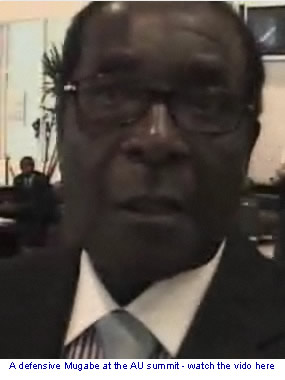Comparative lessons in transitions
Wednesday, July 9th, 2008 by Bev ClarkBack in 2005 Michael McFaul wrote an interesting essay entitled Transitions from Postcommunism. It’s worth reading today in the light of our collective failure to get rid of the regime in Zimbabwe.
The author cites seven important factors which led to a change in government in Serbia, Georgia and Ukraine. McFaul acknowledges that many other factors come into play but focuses on the following as essential:
A semi-autocratic regime
All autocratic regimes are vulnerable to collapse at some point. But which kinds of autocracies are more vulnerable than others? Some observers posit that semi-autocratic or “competitive authoritarian” regimes are more open to democratization than full-blown dictatorships, while others argue that semi-autocracies or partial democracies can actually do more to block genuine democratization by deflecting societal pressures for change.An unpopular incumbent
A second necessary condition for democratic breakthrough in all of these countries was the falling popularity of the incumbent leader. In Serbia, polls put Milo¡seviæ’s popularity at less than 30 percent by the summer of 2000.7 In Georgia, 82 percent of respondents were saying as early as 2001 that the country was going in the wrong direction, up from 51 percent the year before. Kuchma’s approval ratings plummeted during his last year in office.A united opposition
A united opposition—or at least the perception of one—is a third factor that appears crucial for democratic breakthrough, although the extent of unity varies widely enough across the cases that one may question its necessity as a factor. In Serbia and Ukraine, unity before the election was critical to success; in Georgia, less so.Independent electoral-monitoring capabilities
A fourth condition critical to democratic breakthrough in Serbia, Georgia, and Ukraine was the ability of NGOs to provide an accurate and independent tally of the actual vote quickly after polls had closed.A modicum of independent media
A fifth critical element in Serbia, Georgia, and Ukraine was the presence of independent media able to relay news about the falsified vote and to publicize mounting popular protests. For years, such media outlets and brave individual journalists had been reporting the misdeeds of semi-autocratic incumbents. At the moment of breakthrough, autonomous media remained vital in triggering change despite the incumbents’ last-ditch efforts to hang on to power.Mobilizing the masses
A sixth critical factor for democratic breakthrough in Serbia, Georgia, and Ukraine was the opposition’s capacity to mobilize significant numbers of protestors to challenge the falsified electoral results.Splits among the “guys with guns”
A seventh and final necessary condition for success is a split among the “guys with guns,” meaning the state’s military, police, and security forces. A segment of these must distance itself far enough from the incumbents to show that the option of violent repression is risky if not untenable. In all three cases such a split developed, though its size as well as the threat of violence varied from case to case.
The author rightly points out that the presence of only a few of these factors is unlikely to cause the same results. And he reminds us that “A more popular or more clever and ruthless autocrat might have been able to outmaneuver the democratic opposition. A less-organized electoral-monitoring effort in any of these three countries might not have been able to convince people to take to the streets. Smaller numbers of protestors in the streets might have led to outcomes that looked more like Tiananmen Square in 1989 than the big and peaceful wins for democratization that actually happened.”










